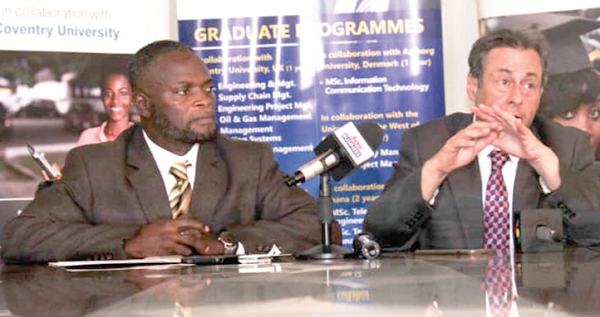
GTUC, Coventry University to expand partnership
The Ghana Technology University College (GTUC) is to expand its partnership with Coventry University (CU) in the United Kingdom (UK) to enable more students in Ghana and the sub-region to obtain international certificates without travelling to the UK.
So far, about 4,000 people have benefited from the programme, which started in 2010 under an arrangement that allows students to school with GTUC but obtain CU degrees.
Known as the transnational education (TNE), the partnership started with 28 students but has since expanded to benefit more students and programmes.
The Vice President of GTUC, Prof. Isaac Blankson, said at a media interaction in Accra that both universities had agreed to enhance the novel programme to enable more students to benefit.
The briefing, which coincided with the graduation of some students under the TNE, was done by Prof. Blankson and
Pride of GTUC
He described the programme as GTUC’s biggest, greatest and most cherished partnership that it would continue to treasure.
Beyond reducing the cost of obtaining a CU degree for beneficiaries, Prof. Blankson said the TNE enhanced the image of GTUC and
As part of plans to expand the programme, he said the two universities had discussed the possibilities of introducing new programmes on
Not money conscious
He explained that the partnership
As a result, he said the two had agreed not to expand just for expansion sake but to ensure that new programmes that would be introduced are capable of addressing emerging challenges.
A case in point, he said was the discussion of the possibility of adding
With cybercrime taking a toll on the economy and the financial sector
Tanzania example
Explaining further,
They intend to do this by introducing a programme in entrepreneurship, he said.
He commended GTUC for its commitment to quality education and hard work in ensuring that the programme succeeded.
While describing the partnership as a strong one,
Although he did not mention why, he
He, however, stressed that TNE was not replacing traditional education system but was only augmenting it in a manner that will help expand education in a manner that did not compromise cost.
He said although other universities in the country might be interested in similar partnerships, CU had decided that GTUC would remain the only partner.